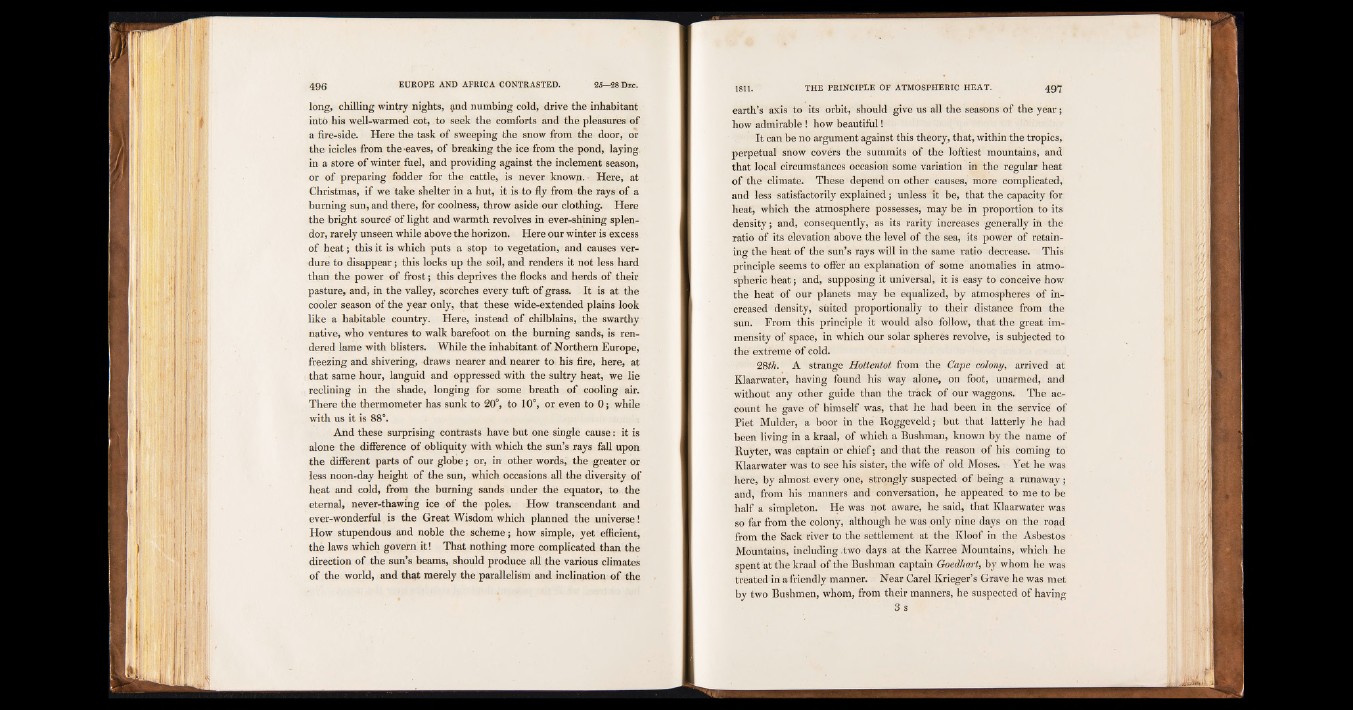
long, chilling wintry nights, and numbing cold, drive the inhabitant
into his well-warmed cot, to seek the comforts and the pleasures of
a fire-side. Here the task of sweeping the snow from the door, or
the icicles from the eaves, of breaking the ice from the pond, laying,
in a store of winter fuel, and providing against the inclement season,
or of preparing fodder for the cattle, is never known. ■ Here, at
Christmas, if we take shelter in a hut, it is to fly from the rays of a
burning sun, and there, for coolness, throw aside our clothing. Here
the bright source" of light and warmth revolves in ever-shining splendor,
rarely unseen while above the horizon. Here our winter is excess
of heat ; this it is which puts a stop to vegetation, and causes verdure
to disappear ; this locks up the soil, and renders it not less hard
than the power of frost ; this deprives the flocks and herds of their
pasture, and, in the valley, scorches every tuft of grass. It is at the
cooler season of the year only, that these wide-extended plains look
like a habitable country. Here, instead of chilblains, the swarthy
native, who ventures to walk barefoot on the burning sands, is rendered
lame with blisters. While the inhabitant of Northern Europe,
freezing and shivering, draws nearer and nearer to his fire, here, at
that same hour, languid and oppressed with the sultry heat, we lie
reclining in the shade, longing for some breath of cooling air.
There the thermometer has sunk to 20°, to 10°, or even to 0 ; while
with us it is 88°.
And these surprising contrasts have but one single cause : it is
alone the difference of obliquity with which the sun’s rays fall upon
the different parts of our globe ; or, in- other words, the greater or
less noon-day height of the sun, which occasions all the diversity of
heat and cold, from the burning sands under the equator, to the
eternal, never-thawing ice of the poles. How transcendant and
ever-wonderful is the Great Wisdom which planned the universe !
How stupendous and noble the scheme; how simple, yet efficient,
the laws which govern it! That nothing more complicated than the
direction of the sun’s beams, should produce all the various climates
of the world, and that merely the parallelism and inclination of the
earth’s axis to its orbit, should give us all the seasons of the year;
how admirable ! how beautiful!
It can be no argument against this theory, that, within the tropics,
perpetual snow covers the summits of the loftiest mountains, and
that local circumstances occasion some variation in the regular heat
of the climate. These depend on other causes, more complicated,
and less satisfactorily explained; unless it be, that the capacity for
heat, which the atmosphere possesses, may be in proportion to its
density; and, consequently, as its rarity increases generally in the
ratio of its elevation above the level of the sea, its power of retaining
the heat of the sun’s rays will in the same ratio decrease. This
principle seems to offer an explanation of some anomalies in atmospheric
heat; and, supposing it universal, it is easy to conceive how
the heat of our planets may be equalized, by atmospheres of increased
density, siiited proportionally to their distance from the
sun. From this principle it would also follow, that the great immensity
of space, in which our solar spheres revolve, is subjected to
the extreme of cold.
9,3th. A strange Hottentot from the Cape colony, arrived at
KlaarWater, having found his way alone, on foot, unarmed, and
without any other guide than the track of our waggons. The account
he gave of himself was, that he had been in the service of
Piet Mulder, a boor in the Roggeveld; but that latterly he had
been living in a kraal, of which a Bushman, known by the name of
Ruyter, was captain or chief; and that the reason of his coming to
Klaarwater was to see his sister, the wife of old Moses. Yet he was
here, by almost every one, strongly suspected of being a runaway;
and, from his manners and conversation, he appeared to me to be
half a simpleton. He was not aware, he said, that Klaarwater was
so far from the colony, although he was only nine days on the road
from the Sack river to the settlement at the Kloof in the Asbestos
Mountains, including .two days at the Karree Mountains, which he
spent at the kraal of the Bushman captain Goedhart, by whom he was
treated in a friendly manner. Near Carel Krieger’s Grave lie was met
by two Bushmen, whom, from their manners, he suspected of having
3 s